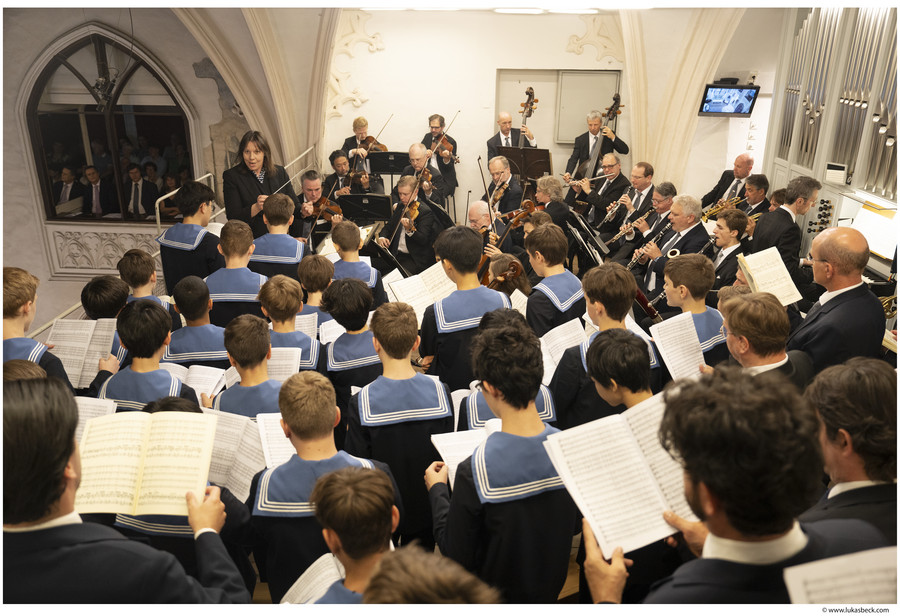Antonio Salieri (1750-1825): Requiem in C minor
Antonio Salieri, the last Italian to hold the office of Hofkapellmeister, came to the Viennese court in 1766 with the help of court composer Florian Gassmann, where he himself became court composer and director of the Italian opera in 1774. He was finally appointed Hofkapellmeister in 1788, a position he held until his retirement in 1824, making him the longest-serving Hofkapellmeister of the Court Music Ensemble.
During his creative period, he wrote more than 40 operas, numerous secular and religious vocal works, serenades, instrumental concertos and ballet suites. However, the number of his symphonic works remained small, as did the number of his masses, of which he wrote only five. His masses were intended for the Court Music Ensemble and, according to Friedrich Rochlitz, were written ‘for God and Emperor’ during his time as Hofkapellmeister.
He composed his Requiem in C minor in 1804 with the request that it be performed at the funeral services for his own death. On 22 June 1825, Salieri's Requiem was premiered at the funeral mass for the composer in Vienna's Minorite Church by the Court Music Ensemble under the direction of Joseph Eybler, who had succeeded Salieri as Hofkapellmeister.
In the header of the autograph manuscript Salieri noted: "Picciolo Requiem composto da me, e per me, Ant. Salieri, piccolissima creatura." He thus explicitly defines the purpose of this work and demonstrates great modesty and humility in view of its strong personal reference. What ultimately prompted him to compose his own Requiem 21 years before his actual death is not immediately known. However, in view of the many deaths in his immediate family (he lost his parents as a teenager, three of his eight children before 1804 and his only son in 1805), it is not surprising that he was also clearly aware of his own mortality. The fate of his mentor Gassmann, who also composed his own Requiem but was unable to complete it before his death, may also have been an important influence here. Requiem settings were among the most important works of a composer in his time. Salieri was probably influenced by Joseph Eybler's Requiem (1803), but also by the first printing of Mozart's Requiem in 1800.
Requiems played a much greater role in the repertoire of the Court Music Ensemble, but also in church music outside the court, than in contemporary church music. The liturgical occasions for a requiem were not only the actual mass for the soul on the occasion of a death, but in the case of the ruling house also annual memorial masses on the occasion of the memorial days of deceased members of the imperial house. Only the tradition of celebrating a requiem on All Souls' Day has survived to this day. As the Court Music Ensemble today only performs on Sundays, it is very rare for a requiem to be performed by the Court Music Ensemble in a liturgical setting.
Salieri's church music is generally characterised by humility and devotion and avoids operatic elements, which are more common in the church music of his contemporaries. Particularly noteworthy in Salieri's Requiem is the prevalence of melodic homophonic passages, which he favoured here over the counterpoint that dominated contemporary church music. The text sections are combined into large musical movements and not subdivided. The Dies Irae, which is very rich in text, is not divided into individual movements, but is composed in one piece. The instrumentation is based on the usual size of the Court Music Ensemble with strings, 2 oboes, 2 bassoons, 2 trumpets, 2 trombones (alto and tenor) and timpani, which was only expanded to include an English horn and a third trombone.
Sebastian Bürger, June 2025
Sources:
- Salieri, Antonio: Requiem. With Two Related Motets, ed. by Jane Schatkin Hettrick. A-R-Editions, Middleton, Wisconsin, 2017, S. viii–xxi.
- Rice, John A. & Hettrick, Jane S.: Art. „Salieri, Antonio“, in: MGG Online, ed. by Laurenz Lütteken, Kassel et al., 2016.
Conductor: Mirjam Schmidt
Organist: Jeremy Joseph
Choir: Vienna Boys Choir, Vienna State Opera men's choir, "Choralschola der Wiener Hofburgkapelle"
Orchestra: Members of the Vienna State Opera Orchestra
Celebrant: Peter Schipka
Duration: approx. 100 min (09:15-10:55)
Ticket reservation at office@hofmusikkapelle.gv.at
Online ticket sale through Culturall:


